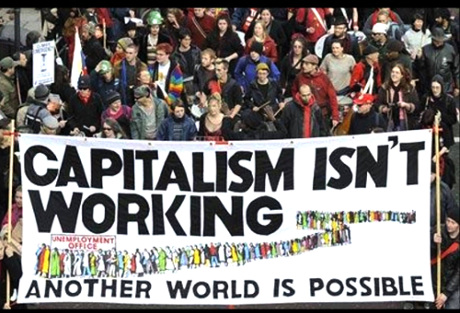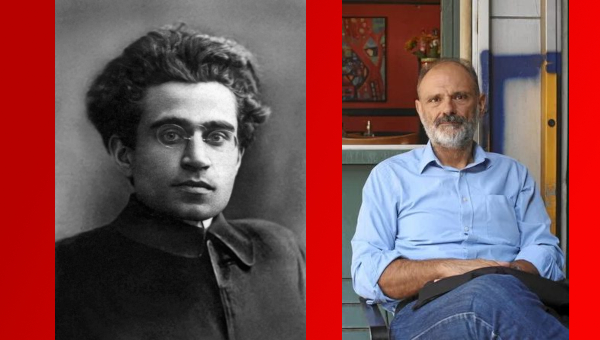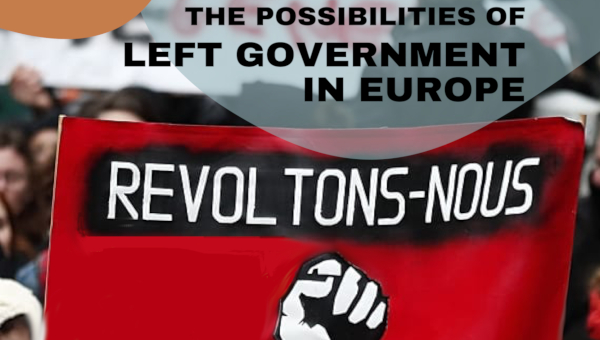The Challenges Facing the Anti-Capitalist Left in Europe
The anti-capitalist Left in Europe is in crisis. From the crisis of the International Socialist Tendency, to the political implosion of the New Anticapitalist Party in France, and from the fragmentation of the left-tendencies of Rifondazione Comunista in Italy to the inability of ANTARSYA in Greece to broaden its appeal despite the immense political shifts in Greek society. Most tendencies that refer to a revolutionary critique of socialist and communist reformism and reclaim the legacy of May 1968, are today facing a deep political crisis.
 This comes in sharp contrast to a previous period, from the second half of the 1990s onward, during which the anti-capitalist Left was more than instrumental in the development of the anti-globalization movement, was a vanguard in various major struggles at the national level, acted as a catalyst in the formation of broader initiatives, and in certain cases made important electoral advances. What is more impressive is that this crisis of the anti-capitalist Left coincides with a period of both a systemic capitalist crisis and an impressive return of mass movements.
This comes in sharp contrast to a previous period, from the second half of the 1990s onward, during which the anti-capitalist Left was more than instrumental in the development of the anti-globalization movement, was a vanguard in various major struggles at the national level, acted as a catalyst in the formation of broader initiatives, and in certain cases made important electoral advances. What is more impressive is that this crisis of the anti-capitalist Left coincides with a period of both a systemic capitalist crisis and an impressive return of mass movements.
In this sense, the schema suggested recently by Alex Callinicos that the era of good feelings for the anti-capitalist Left was from 1998-2005, between the electoral rise of the French Anticapitalist Left (and of the anti-global movement), and the rejection of the European Constitution, however correct it might be as a timeline of a certain form of anti-capitalist politics in the 2000s, is also an underestimation of the importance of the current conjuncture and its dynamics.
Right Conditions for the Left?
What better condition could we hope than the one facing us today, despite our problems, crises and shortcomings? Actual cracks in the neoliberal hegemony, an open crisis of the main strategy of European capital in the past five decades, namely the European Integration, societies questioning their certainties, a return of mass protest and mobilization that in certain cases took an almost insurrectionary character, a desire to reclaim democracy, popular sovereignty and public space, a growing distrust of politicians and an international balance of forces, that not only contradicts any claim to American omnipotence but also offers points of reference of resistances from Gaza to Kobane.
Of course, we do not underestimate other elements of the conjuncture such as the return of the ugly face of fascism and the rise of the far-right. However, this is also an expression of a deeper political crisis, and of an inability of the radical and anti-capitalist Left to become, in its own progressive and emancipatory fashion, a vehicle for the expression of the distrust of systemic parties and politics.
So here is the main challenge: Why are we in a condition of crisis? Why, for example, is it SYRIZA, with the impressive right wing turn of its leadership, the most successful example of left-wing politics in Europe today?
Limits of Anti-Capitalism
I think that the main reason for our problems has to do with the limitations of the anti-capitalist Left since the 1990s. The anti-capitalist Left was mainly a force of resistance, of support for movements and of a general ideological defence of socialism and revolution. It could be instrumental in organizing anti-neoliberal movements and recruit new membership especially in radicalized movements of the Left. However, it had no actual strategy. Questions of power, hegemony, and of revolutionary strategy were left unanswered, despite Daniel Bensaïd’s call to reopen the debate on strategy.
This distance between everyday tactics, either in movements or in electoral coalitions, which were mainly based on a basic anti-neoliberal agenda – that was the main form of ‘anti-capitalism’ in the 2000s – and an abstract defence of revolutionary politics per se, in terms of identity rather than practice, defined this strategic void.
It could offer no viable alternative to the ‘temptation’ toward ‘everything but’ coalitions, exemplified in the disastrous participation of Rifondazione Comunista to the second Romano Prodi government (as an ‘anything but Berlusconi’ government) and the limits of the ‘united Fronts of a special kind.’
Moreover, it could not think in terms of a potential historical block, of how we can articulate a broad alliance of the subaltern classes with an alternative narrative for societies. But how could we offer an alternative narrative when the main programmatic position was ‘redistribution + defence of public services.’ I don’t underestimate these goals but they are not alternative narratives; they do not present an antagonistic social and political paradigm to neoliberalism.
Moreover, especially in Europe, and despite the fact that the high moment of radical Left mobilization in western Europe was the rejection of the European constitution, the anti-capitalist Left has underestimated the critique of European Integration. The abandonment of any critique of the single currency and
accusing those who attempted such a critique as ‘nationalists’ or ‘social-chauvinists’ only meant that in a period of growing disillusionment and crisis of the European Project, it was only the far-right with its ersatz ‘Euroscepticism’ (ersatz because of their pro-systemic, pro-business positions) that gathered some political momentum, exemplified in the last European Elections.
The political space was left open only to positions such as the ones suggested by SYRIZA, to look like a confrontation with the question strategy although they do not go beyond
simply repeating varieties of anti-neoliberal ‘progressive governance’ positions from the 1990s. In a period when in weak links of the chain the possibility of combining a radical left government with forms of popular power from below could actually initiate a highly original revolutionary sequence,
the position of important segments of the anti-capitalist Left in Europe was practically that nothing can be done and it will be repetition of the 1970s.
Moreover, although there were important mass movements in the past years, in terms of magnitude and duration but also in terms of the social and political experimentation with new forms of democracy, equal voicing, horizontal coordination, emergence of new leadership, most tendencies of the Left, with the exception of the Spanish anti-capitalist Left, did not actually learn anything from these movements to which they nevertheless made a considerable contribution. They did not learn
from the new forms of democracy, they did not incorporate the new leadership emerging from the movements, they did not attempt to answer the strategic challenges they posed. They simply saw them as movements not as experimental processes. This is in sharp contrast to the Marxist and Leninist traditions of seeing the participation in movements as a learning and transformative experience.
Consequently, current calls to reinstate the process of ‘building the organization’ are off the mark. Not that we do not need revolutionary organizations, but this is only one, and perhaps not the most important, aspect of the necessary re-composition of the anti-capitalist Left today. Moreover, the mentality that each group is the bearer of revolutionary truth and it has to get stronger in broader fronts, with the other tendencies in the fronts treated as ‘reformist’ or ‘quasi-reformist’ is not actually helpful in initiating broader processes of recomposition. The same goes with the mentality that what is at stake is the historical vindication of a particular historical current. We need to think in terms of radical novelty.
What is the result of these shortcomings? The result is that today most people in the European Left turn toward SYRIZA for an example of hope, despite the fact that the leadership of SYRIZA has abandoned most radical positions, has fully accepted the institutional framework of the Eurozone and of the debt, and refused to incorporate the nationalization of banks and strategic enterprises into the set of immediate demands. Or, to give another example everyone is putting some hope in the PODEMOS project even though its political line has lost some of its more radical edge and there are open questions about the model of leadership adopted. In the appeal of SYRIΖΑ and PODEMOS for militants the main point is not the actual politics and strategies, but two crucial elements: the putting in place of a broad political process, one that includes large segments of the movements and of course the confrontation with the question of political power and potentially hegemony.
Potentially Revolutionary Strategy
However, I am not sure that today the general rule has to be the entrance or incorporation of the anti-capitalist Left in such broad fronts. The reason is that the necessary autonomy of a potentially revolutionary strategy remains a necessity. This is one aspect of ‘repeating Lenin’ today that is still relevant.
Does this mean sectarianism? The answer is definitively no! The challenge for the revolutionary or anti-capitalist Left is not to choose between broad electoral fronts or between traditional sects. The challenge is to elaborate upon an alternative project for the Left, an alternative project that one way or the other must focus upon what today might be defined as a potentially revolutionary strategy.
First of all, we need to think in terms of a new historical block. In my reading, this Gramscian concept is neither analytical nor descriptive in nature. It does not simply refer to a social alliance. It is a strategic concept that refers to how we can have the encounter between a broad alliance of the subaltern classes, an alternative narrative for societies and new mass political forms. In this sense, it would be wrong to underestimate the importance of the kind of mass reclaiming of popular sovereignty we saw in recent movements, exemplified in the reclaiming of public space, in the name of some ideal type of the ‘worker’s movement’ or the ‘general strike.’ Rather, it would be more interesting to think that in the forms of common protest and solidarity and democratic thrust we can see the emergence of embryonic forms of such historical blocs.
Such a conception suggests the importance of the political program. This has nothing to do with the theology of the program or with some sort of revolutionary political fantasy. The transition program is the articulation of the experiences, demands, experimentations, forms of collective ingenuity arising from the movement, with the collective attempt toward actually discerning the different roads that our societies are facing. It is the articulation of the ‘traces of communism’ in contemporary struggles and non-commodified collective practices, with the attempt of the forces of labour to actually lead societies into alternative trajectories, both in terms of social configuration and international position.
In this sense, a contemporary version of the transition program cannot be reduced to simple calls for redistribution and defence of public services. It has to be a more profound search for a different road for societies, including a different social and economic paradigm, based upon new forms of democratic public ownership, self-management, new networks of distribution, and different social priorities. It is not going to be an ‘easy road.’ It would require a struggling society actually changing values, priorities, narratives. It would also require a new ethics of collective participation and responsibility, of struggle and commitment to change, a transformed and educated common sense that becomes ‘good sense.’
In Europe this necessarily means a rupture with the embedded aggressive neoliberalism of the Eurozone and in general the ‘limited sovereignty’ imposed by the various treaties that define the contemporary version of European Governance. We have the opportunity to combine the demand for social justice with the demand for popular sovereignty.
However, such a conception also entails dealing with the question of revolutionary strategy today. In the current conjuncture, with the crisis of neoliberal hegemony and the return of mass protest a more strategic conception has to be a necessary element.
What actually does it mean to have a revolutionary sequence today? In most cases, the question is repressed. One the one hand we have the dynamics of the movement, on the other
hand, at some undefined but distant point in time, we will have worker’s control and revolution. Questions, such as the possibility of a left-wing government and whether they can be part of a revolutionary sequence are treated as the responsibility of ‘reformists,’ with the radical or anti-capitalist Left simply waiting for their failure.
Process of Transformation
I would like to suggest that in contemporary European societies, we consider the question of governmental power not in terms of a progressive management of capitalism but
as an aspect of a possible process of transformation. Such a perspective can include the combination of a radical Left government, based upon the necessary transition program, with strong movements from below, movements of popular power, worker’s control, self-management, solidarity; new profound institutional changes and new forms of democratic participation, a Constituent Process. It is a path that will necessarily be uneven, contradictory, and experimental in nature. It will be a process that will face fierce opposition from the forces of capital and imperialism.
Of course this would also mean actually opening the debate on what does ‘smashing the state’ or ‘withering away of the state’ means, on how to implement new forms of
democratic planning and self-management in opposition to the compulsion of the market, on how to incorporate the experiences coming from the movements.
One might ask the question: Why bother with the full elaboration of a revolutionary strategy instead of simply articulating our critique of reformism? I think that if we leave the debate on left-wing governance to reformist tendencies it is obvious that they will see things through their own lenses, the lenses of the rather ill fated debates on progressive governance of the 1990s and the early 2000s that led to the disastrous effects of the participation in the Jospin and Prodi governments. Failure then might be a ‘self-fulfilled prophecy.’ It is not certain that it will be followed by a new emergence of the revolutionary forces to the forefront. Such a failure can also simply lead to the even more reactionary realignment of the political scene.
This means that it is actually imperative for the revolutionary and anti-capitalist Left to think
in terms of an alternative project not simply an alternative topography of the Left.
“We want political organizations that are at the same time laboratories for the collective elaboration of new projects and new mass forms of critical political intellectuality … they have to be more democratic, more egalitarian, more open, less hierarchical and less sexist than the society around them.”
This also poses organizational exigencies. What kind of political organizations do we need in order to be able to attempt such a revolutionary process? The traditional model that viewed, in a schematic and mechanical way, the confrontations with the question of power in terms of a military logic, placing all the emphasis on discipline, is of course inherently inadequate, and moreover runs the risk of imitating the model of the bourgeois state. It is necessary to think that in the struggle for a different society, based upon principles and practices antagonistic to the bourgeois/capitalist logic, we need organizations that reflect the emerging new social forms. In contrast to the traditional view – according to which the exigencies of the struggle and the need for disciplined commitment to the revolutionary process justify limits to intraparty democracy, suppression of free discussion, and rigid hierarchy – we want political organizations that are at the same time laboratories for the collective elaboration of new projects and new mass forms of critical political intellectuality, and experimental sites for new social and political relations. In this sense, they have to be more democratic, more egalitarian, more open, less hierarchical and less sexist than the society around them.
However, this should not be considered an abstract exigency, but as an urgent task which also entails the whole process of reconstructing and reinventing political organizations. Contemporary radical political organizations do not reflect only the dynamics of the conjuncture and current struggles; they are also the result of a whole period of crisis and retreat of the communist and revolutionary socialist movement. At the same time, we must acknowledge the originality, the strengths but also the limitations of the main organizational forms emerging from the movement. The ‘horizontal coordination’ of movements, which is indispensable in order to create alliances and open spaces of struggle, does not always aid the necessary elaboration of political programs. And usually does not permit any discussion of questions of political power and hegemony. The left-wing ‘electoral front’ that usually is based on a minimum program of immediate anti-neoliberal reforms can easily take the form of a reformist agenda for progressive social democratic governance. The classical model of the revolutionary group or sect (along with the respective international currents) that tend to reproduce fragmentation, sectarianism, and a parochial authoritarian version of an ‘imaginary Lenin.’
In contrast, ‘repeating Lenin’ today means thinking in terms of maximum originality, of trying not just to reproduce some model but to create laboratories of new political projects. This can be accomplished neither by simple electoral coalitions nor by an antagonism between groups for ‘hegemony’ within the radical Left. We need democratic political fronts, our own version of the United Front strategy, based upon anti-capitalist programs that can also act as processes that can bring together different currents, experiences in the movement, political sensitivities that can actually act as laboratories of new and antagonistic political projects. We need fronts that can bring together different orientations and sensitivities, different experiences and different histories. We need political ‘constituent processes’ based upon the need to overcome the fragmentation and crisis of the anti-capitalist Left and actually have processes of recomposition. We need to fully accept that the current organizations and currents of the anti-capitalist Left are transitory, are aspects of a process of transformation and collective elaboration of new political projects that have yet to emerge, that they need to be superseded both in terms of organization but also strategy. This could be our necessary, more necessary than ever, self-criticism.
Therefore, it is imperative to open this debate at all levels, both national and international, learn from our advances and our mistakes, discuss in the most open-minded way the different experiences, avoid sectarian and bureaucratic mentalities and create not just venues for dialogue and exchange of ideas, but actual laboratories of hope.
Because how can we change society if we cannot change ourselves… •
This text is based on his presentation at the Historical Materialism Conference in London (6 November 2014), and first published on his blog at lastingfuture.blogspot.gr.





